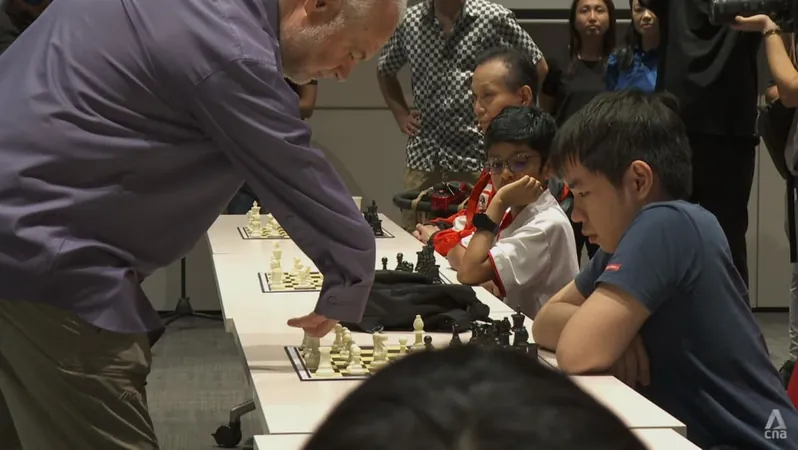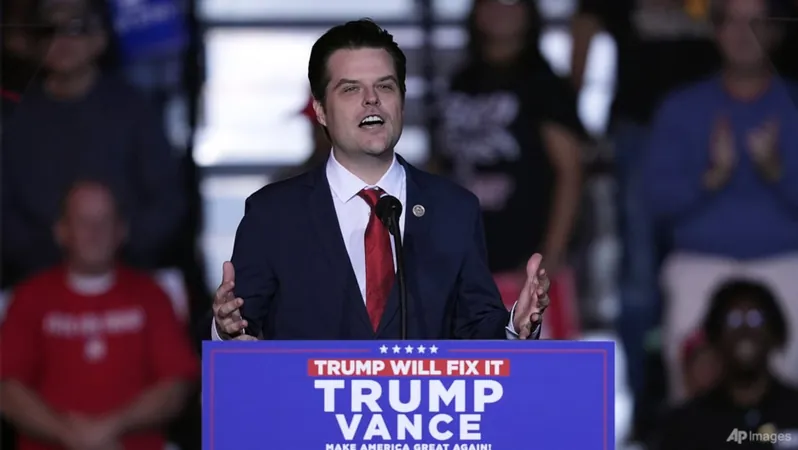
Unlocking Potential: How Chess Empowers Children with Disabilities
2024-11-26
Author: Daniel
SINGAPORE: In an inspiring move towards inclusivity, experts are advocating for increased exposure of children with disabilities to chess, recognizing its unique power to foster self-confidence and break down social barriers. Kevin Goh, CEO of the Singapore Chess Federation, emphasized the importance of introducing chess at a young age, saying, “We should have kids with disabilities learning chess early on and growing to love the game.”
Despite the existence of a weekly para-chess program in Singapore, participation remains low. Goh, who is also a chess grandmaster, stated, “We are currently not doing enough,” and he expressed a strong desire to expand opportunities for these young players. Plans are already underway to collaborate with the International Chess Federation to launch a para-chess event in 2025, aiming to provide more resources and support for children with disabilities.
Chess: An Inclusive Game for All
"Chess is an incredibly inclusive game," Goh articulated. "There’s no reason we shouldn’t have a robust training program to aid kids with disabilities. The game can offer significant benefits that boost their confidence and enable them to contribute meaningfully to society.”
One key figure inspiring these changes is Thomas Luther, the training director for the Singapore Chess Federation. Born with dysmelia, a condition affecting limb development, Luther became the first chess player with a disability to break into the world’s top 100 rankings. His story is a testament to the fact that disabilities do not diminish one’s potential in chess—only knowledge of the game truly matters.
The upcoming Singapore International Open, kicking off soon, will exemplify this inclusivity, featuring participants with and without disabilities competing side by side. Goh noted that engaging more children in chess competitions could significantly improve their self-esteem and life skills.
Building a Sustainable Future for Para-Chess
To create a lasting impact, organizers aim to develop a sustainable framework for integrating chess into schools for special needs children and other organizations dedicated to helping kids with disabilities. “Our dream is to have a strong, ongoing program that consistently brings chess to these children,” Goh remarked.
Additionally, Goh highlighted inspiring examples from major competitions, such as the World Chess Olympiad, where blind and physically impaired players team up with national squads. This shows that the game transcends physical barriers, as it invites diverse minds to participate, enhancing the richness of the sport.
For many young players, chess has already proven transformative. Ten-year-old Audelle Sim, who is hearing impaired, participated in a recent para-chess showcase alongside both disabled and able-bodied players. She remarked, “Chess has helped me focus and think better,” illustrating the profound impact the game can have on someone’s cognitive and social skills.
Chess: More Than Just a Game
Through initiatives like these, chess is not just a game—it is a powerful tool for social change and individual empowerment. It stands as a beacon of hope for children with disabilities, promising a brighter future where they can thrive both on and off the board. As Singapore gears up for upcoming events and initiatives, the hope is that the lessons learned and friendships forged through chess will extend far beyond the game itself.



 Brasil (PT)
Brasil (PT)
 Canada (EN)
Canada (EN)
 Chile (ES)
Chile (ES)
 España (ES)
España (ES)
 France (FR)
France (FR)
 Hong Kong (EN)
Hong Kong (EN)
 Italia (IT)
Italia (IT)
 日本 (JA)
日本 (JA)
 Magyarország (HU)
Magyarország (HU)
 Norge (NO)
Norge (NO)
 Polska (PL)
Polska (PL)
 Schweiz (DE)
Schweiz (DE)
 Singapore (EN)
Singapore (EN)
 Sverige (SV)
Sverige (SV)
 Suomi (FI)
Suomi (FI)
 Türkiye (TR)
Türkiye (TR)